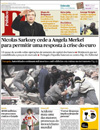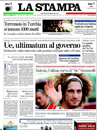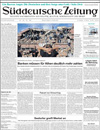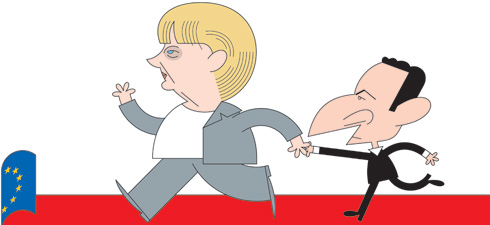“Nicolas Sarkozy gives in to Angela Merkel in establishing a response to the euro crisis”: this is how Público summarises the results of the 23 October summit. The French President gave into ”German intransigence”, and discussions were restricted to contentious issues:

Yesterday, the debate reached a point where people were wondering if we should request aid from China. The atmosphere was also marked by Angela Merkel’s determination not to deviate from her strategy. For the most part, she succeeded in doing so. And her strategy has not changed: imposing austerity and fiscal discipline in indebted countries is the only method to overcome the crisis, whether it be in Portugal, Greece, Italy, Spain,or even in France. What did change was that more and more voices were raised to contest this stance from EU states that are worried about shrinking growth and the growing threat of economic recession. However, Berlin remains completely indifferent. – Público
In Greece, *Eleftherotypia* argues that Prime Minister George Papandreou and his Minister of Finance, Evangelos Venizeols, were only given a “a walk-on role in Brussels”, where “the Europeans organised the voluntary decapitation of Greece”, while the front page of rival daily *To Ethnos* deplores “Merkel’s blackmail”:

The Chancellor is not aware of the consequences of her all-out drive to impose austerity. And for the Greeks, it will be an austerity that endures for a very long time. – To Ethnos
Writing in Italy, another “bad debtor” taken to task at the meeting, economic analyst Marta Dassù points out in *La Stampa* that the only country that has the weight and the necessary instruments to extricate Europe from the euro crisis is Germany, which, on these issues, “has had its hands tied by its own parliament”:

The monetary union can only ovecome the crisis if the countries that are currently leading it — and in particular Germany — raise their level of solidarity […] and only if indebted countries raise their level of credibility by pushing through reforms and maintaining budgetary discipline. With this in mind, the two summits this week have the potential to make progress, at least in theory. If the German plan succeeds, it will lead to the development of a two-tier Europe with a core level founded on the euro, whose institutions will to some extent be separated from those of the 27-member state EU. – La Stampa
In Spain, El Periódico leads with the front-page headline: “Euro surrenders to Merkel”. For the Catalan daily, the Chancellor succeeded in “imposing her views” on Sunday’s summit:

Angela Merkel and the ECB are categorically opposed to the possibility of unlimited ECB funding [for countries in difficulty], which they argue would amount to a violation of EU treaties that forbid the ECB to finance the public debt of member states. Although he had support from Spain and a majority of Eurozone countries, Nicolas Sarkozy was forced to give way to the bloc formed by Germany, the Netherlands, Finland and the ECB. – El Periódico de Catalunya
For German daily *Süddeutsche Zeitung*, this is the first time since the beginning of the crisis that Europe has taken a look in the mirror of truth. And what Europe has seen is not encouraging: it was a look into the “void”, writes the Munich-based newspaper:

Notwithstanding the billions that have been released on paper, we have to bear in mind that no amount of money mobilised will save the euro. All it will do is buy time to resolve underlying problems. We have to stop the 17 member states from drifting apart economically; and in order to do this, we will have to exercise good management. As time is running short, the summit to be held this Wednesday will have to introduce real changes, like the creation of a powerful and independent Budget Commissioner, which has been demanded by several countries. Berlin, which is insisting that the treaties first be changed, runs the risk of transforming the slide of the euro into a freefall. – Süddeutsche Zeitung
In contrast, Die Welt defends the point of view of the German government:

If some countries opt to print money to sustain their economies, other countries will have to foot the bill. The confidence of citizens and markets will only be restored if all of the members of the euro agree to either leave the club or follow the rules for stability. – Die Welt
In France, *Libération* argues that the crisis has highlighted an assymetry in the Franco-German couple which favours Berlin:

In the old Franco-German couple, one party has clearly assumed a dominant role. This has not happened overnight: from the outset the euro was designed to resemble the Deutsche Mark which was the product of a singular currency culture marked by the drama of hyperinflation and political failure in the 1930s. This domination was masked by the strength and the daring of the collective drive to create a single currency, but the violence of the current financial crisis has revealed the true face of the euro. From the other side of the Rhine, pledges made by France and French influence are not what they used to be, and so it is that solutions to the euro crisis proposed by the Elysée — no matter how appropriate — are unlikely to be accepted. In spite of the resolute activism of the French President who stands behind the Chancellor on every occasion, our financial credibility has suffered a serious blow. – Libération
Was this article useful? If so we are delighted!
It is freely available because we believe that the right to free and independent information is essential for democracy. But this right is not guaranteed forever, and independence comes at a cost. We need your support in order to continue publishing independent, multilingual news for all Europeans.
Discover our subscription offers and their exclusive benefits and become a member of our community now!












